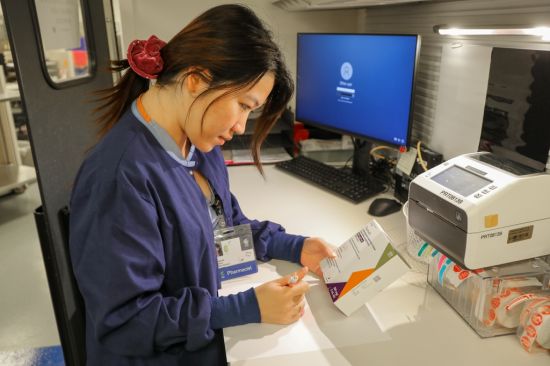Telemedicine bridging urban-rural divide in HIV prevention
OHSU program, study aim to overcome barriers to accessing pre-exposure prophylaxis
December 01, 2023 | By Franny White

Su Yadana Oo, RPh., pharmacist at the OHSU Home Infusion Clinic pharmacy in Beaverton, checks the package of pre-exposure prophylaxis, or PrEP. PrEP is an antiretroviral medication that reduces the risk of getting HIV from sexual intercourse by about 99%. (OHSU/Christine Torres Hicks)
Portland, Oregon —To increase statewide usage of a highly effective drug that prevents HIV, an Oregon Health & Science University telemedicine program is bringing it directly to Oregonians’ homes.
Pre-exposure prophylaxis, or PrEP, is an antiretroviral medication that reduces the risk of getting HIV, the virus that causes AIDS, from sexual intercourse by about 99%. It has been commercially available since 2012, when the Food and Drug Administration approved the first daily prescription pill. In 2021, the FDA approved another PrEP option, an every-other-month injection.
Even though the Affordable Care Act made PrEP free with nearly all health insurance, only about 30% of Americans who were eligible for the preventive treatment in 2021 used it. And less than 24% of eligible Oregonians used PrEP that same year. There are also inequities in its use: Black, Latino and other people of color are less likely to be on PrEP — and more likely to be diagnosed with HIV — than white people.
On World AIDS Day, Dec. 1, OHSU is working to raise awareness about better access to this lifesaving treatment.
Christopher B. Fox, M.S.N., RN (OHSU)
“PrEP is extremely good at preventing HIV — when people can use it,” said Christopher B. Fox, M.S.N., RN, an assistant professor of medicine (internal medicine and geriatrics) in the OHSU School of Medicine who works at the OHSU HIV Clinic. “However, people who have an increased risk for HIV also often face challenges accessing health care, and some health care providers don’t prescribe PrEP because they mistakenly assume a patient doesn’t need it.
“Telemedicine — which enables patients to receive health care from the comfort and safety of their own homes — can help overcome these barriers.”
Oregonians interested in learning more about OHSU’s Oregon PrEP at Home Study can email prepstudy@ohsu.edu or call 833-770-1400.
To enable patients to receive HIV-preventing medication without needing to physically come to OHSU, Fox partnered with colleagues at the OHSU HIV Clinic to start the OHSU Tele-PrEP Program in 2021. The program has served 54 patients to date, and offers virtual PrEP care to Oregonians through video and phone calls with OHSU HIV prevention specialists.
Pharmacists work closely with patients on scheduling and reminders, insurance approval and applying for financial assistance programs that can help pay for the shots. When patients prefer injectable PrEP, the program partners with the OHSU Home Infusion Pharmacy to deliver it directly to patients in their homes. A registered nurse then visits patient homes to give the injection and to collect lab samples to monitor for HIV and other sexually transmitted illnesses. PrEP shots must be given by a health professional in a specific part of the buttock.
Now ViiV Healthcare, which manufactures the PrEP injection Apretude, is providing $340,000 in research funding to evaluate telemedicine’s effectiveness in delivering PrEP care. The funding supports a two-year study that will track outcomes for about 125 new OHSU Tele-PrEP patients, and also explore whether telemedicine can reduce geographic disparities that have historically made it easier for patients in urban areas to access PrEP.
Even though PrEP is recommended by the Centers for Disease Control and Prevention and the U.S. Preventive Services Task Force, there are very few health care providers in rural Oregon who routinely prescribe PrEP. For example, Fox doesn’t know of a single provider in the Eastern Oregon towns of Hermiston or Pendleton that offers PrEP.
“While there are no PrEP providers in many rural Oregon towns, there are still people there who would benefit from PrEP,” Fox said. “Thanks to PrEP, AIDS is now a preventable disease — but only if people have easy access to this lifesaving preventive therapy.”
PrEP is recommended for people of any gender who have an increased risk for HIV, including:
- Sexually active people who have a sexual partner with HIV, don’t consistently use condoms, or have been diagnosed with a sexually transmitted infection within the past six months.
- Injectable drug users who have a partner with HIV or share drug injection equipment.
About 1.2 million people in the U.S. and 8,000 Oregonians have HIV. Unlike the 1980s, when HIV was new and not well understood, today people who have HIV can live long lives while taking antiretroviral therapies. A U.S. Department of Health and Human Services initiative aims to reduce new HIV infections in the U.S. by 90% by 2030. In 2021, the Oregon Health Authority launched the End HIV Oregon initiative, which supports statewide HIV testing, prevention and treatment.
The study is supported by ViiV Healthcare (grant 220001).
Contact:
Franny White (she/her)
Senior Media Relations Specialist
whitef@ohsu.edu
OHSU | Oregon Health & Science University
Source: https://news.ohsu.edu/2023/12/01/telemedicine-bridging-urban-rural-divide-in-hiv-prevention
"Reproduced with permission - Oregon Health & Science University (OHSU)"
Oregon Health & Science University (OHSU)
For more HIV and AIDS News visit...
Positively Positive - Living with HIV/AIDS:
HIV/AIDS News
|